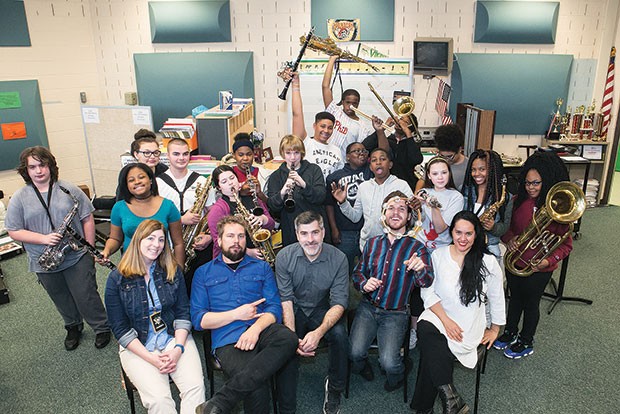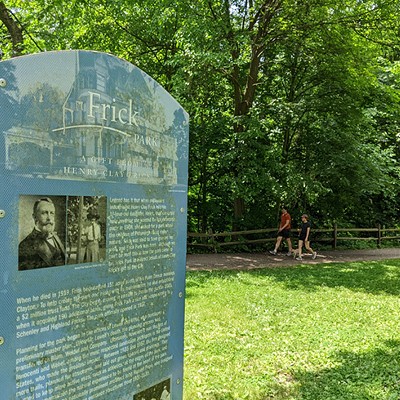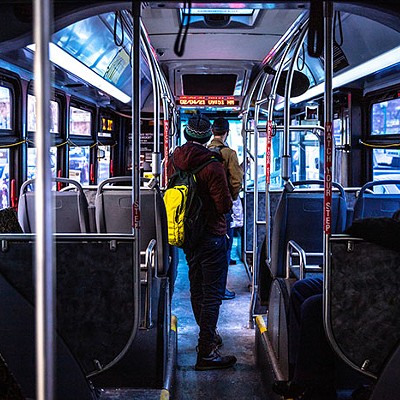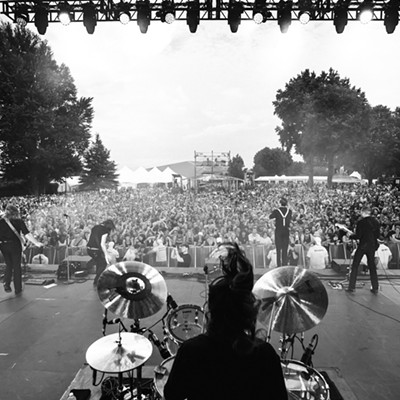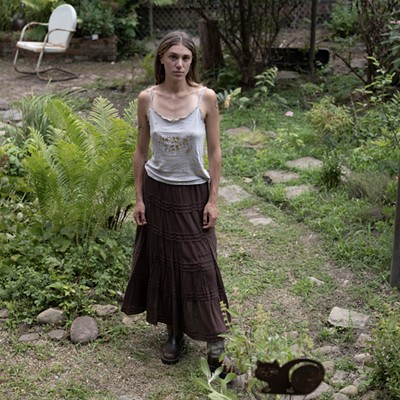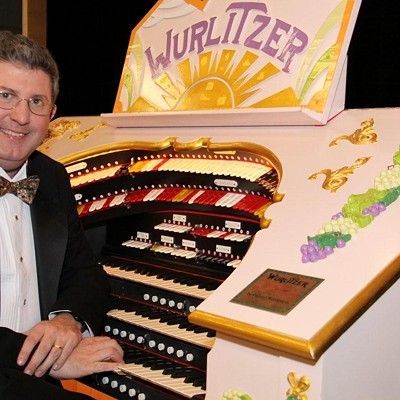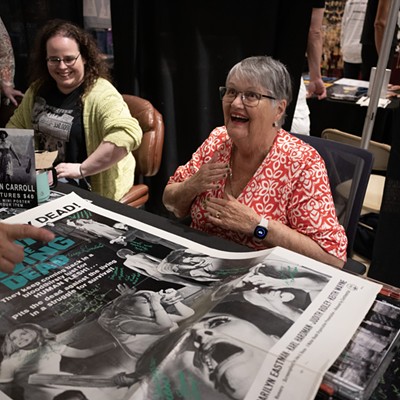Pittonkatonk is not a music festival.
It’s a series of community activities that includes a music-bolstered, family-reunion-style party in Schenley Park each May, but Pittonkatonk is active year-round. It’s a protest, it’s an educational program, it’s a community-organizing catalyst.
One of the Pittonkatonk collective’s biggest campaigns is to bring music education to underserved local schools and communities. Some schools don’t even have a music-education program, and many don’t have enough instruments to go around. Some students have never seen live musicians perform, and the idea of becoming a musician is one that’s inaccessible to many of them. Pittonkatonk aims to change that.
The Pittonkatonk website displays its educational mission with a call to action: “Pittonkatonk may just be a day in the park for you, but for us it’s a year-round initiative that we feel is essential in building community, empowering youth voices through musical expression, and an innovative way of producing grassroots events unlike anything else.”
About three weeks before the May picnic, Pittonkatonk performers Ben Barson and Gizelexanath, from Afro Yaqui Music Collective, visit Sto-Rox School District for a workshop. Afro Yaqui is a political musical group that pairs jazz, funk, hip hop and soul with indigenous music; Afro Yaqui has hosted workshops at schools with Pittonkatonk in the past.
When people donate money to Pittonkatonk’s IndieGogo site, give a cash donation or buy a shirt at the May Day picnic, that money goes toward helping fund workshops like the Afro Yaqui event. School visits in the past have included artists like La Misa Negra, Timbeleza, Low Down Brass Band, Black Bear Combo and Osie Korankye & Colter Harper.
Those dollars contribute to the larger mission of giving disenfranchised people a voice through music.
City Paper sat down at Gooski’s, in Polish Hill, with just two of Pittonkatonk’s volunteers, Rich Randall and “Pandemic” Pete Spynda. The two have been immersed in Pittonkatonk since its inception four years ago. Both Spynda and Randall work for nonprofits and help organize the educational programs within local schools. The pair put a tremendous amount of time and effort to make the in-school workshops, political discussions, panels and May Day picnic happen.
“We want to empower people to be a part of a group or a collective,” explains Randall. “Pittonkatonk is constellation of political actions, workshops and other events. We want people to know that when they contribute time and money, they contribute to all of that.”
As Spynda sees it, the Pittonkatonk BBQ itself is not the be-all, end-all action. “We’re just that spark that starts the fire,” says Spynda. For Spynda and Randall, the concept of a pay-what-you-can event was not new. The two grew up in the world of donation-based house shows.
2017 Pittonkatonk Lineup:
- La Misa Negra (Oakland, Calif.)
- What Cheer? Brigade (Providence, R.I.)
- Afro Yaqui (Pittsburgh)
- Black Bear Combo (Chicago)
- Detroit Party Marching Band (Detroit)
- Lowdown Brass Band (Chicago)
- Extraordinary Rendition Band (Providence, R.I.)
- Timbeleza (Pittsburgh)
- May Day Marching Band (Pittsburgh)
- May Day Choir (Pittsburgh)
- Detroit Pleasure Society (Detroit)
- Drum Lines and Hard Rhymes (Pittsburgh)
- Colonel Eagleburger’s Highstepping Goodtime Band (Pittsburgh)
“We’re trying to take these practices that happen in small groups and neighborhoods,” explains Randall, “What if you had a house show or community meeting where 3,000 people showed up? Now that’s compelling.”
While booking musicians and educational workshops that depend upon community donations probably sounds stressful to most, it’s not fiscal success that dictates a victory.
Spynda tells the story of a young boy who wanted a shirt but had only $5 instead of the suggested $10. Randall urged the boy to take a shirt anyway, and later watched as the young boy jumped into the crowd and surfed during What Cheer? Brigade’s set.
“There’s no ticket price because we don’t want to divide people because they can afford or not afford to come,” says Spynda.
“Money should never be a barrier to participation,” adds Randall.
The collective is aware of those barriers, so it distributes information differently. Instead of relying on Facebook and its website alone, the collective drops off newspaper-style newsletters all over the city, from barber shops and senior centers to libraries and coffee shops.
This year, Pittonkatonk is collaborating with One PA, 1Hood and Fair Districts PA to spread a message of social justice and bring awareness to the issues that all of Pittsburgh’s residents should be concerned with, such as the city’s lack of affordable housing, its racism, and gerrymandered voting districts, to name just a few. The day before the event, Artists Image Resource, on the North Side, will provide a space for Printonkatonk, an event featuring music from the Mayday Marching Band and resources to create your own political art and learn how to screen-print.
“We’re interested in curating partnerships with other organizations that share the same radical ideals as us,” explains Spynda.
“We’re all concerned about these [issues], even if we live in different neighborhoods,” says Randall.
The day in the park is a family-friendly block party for Pittsburgh’s 90 vastly different neighborhoods with an air of celebratory protest. People bring and share food, and dance alongside strangers and performers.
The key to Pittonkatonk’s community engagement on the day of the picnic is picking bands that are mobile. There’s no stage and no green room. Musicians mingle with picnic-goers and dance in the middle of the crowd during their sets. Some bands ask audiences to keep the rhythm or request volunteers to step up and spit bars over a riff or beat they’ve created.
“We want to give our neighbors a voice,” says Spynda. “We want to show them they can just get up and do it, show up somewhere and play.”
Ultimately it is the community that wills Pittonkatonk’s vision into a tangible existence.
“You have to leave it up to everyone to make Pittonkatonk happen. The responsibility is on the community,” points out Spynda. “They’re part of this.”
Pittonkatonk takes place from 1-11 p.m. Sat., May 6, at the Vietnam Veterans Pavilion in Schenley Park, Oakland. The event operates on a pay-what-you-can scale, and food is potluck.

